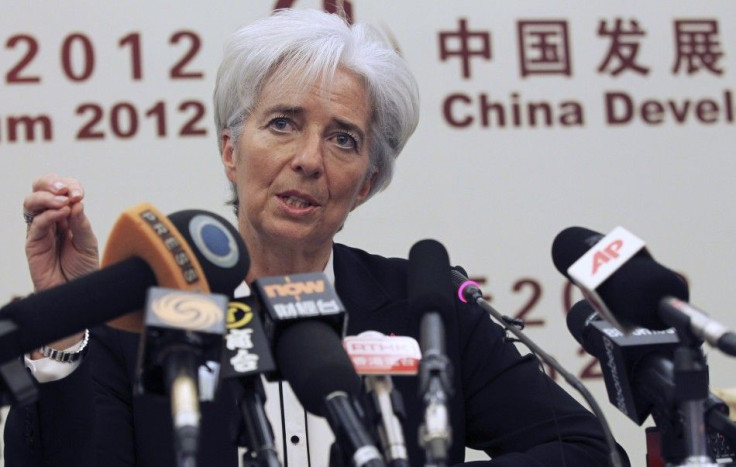Global Economy on Recovery Path: IMF

(Reuters) - The global economy has stepped back from the brink of danger and signs of stabilisation are emerging from the euro zone and the United States, but high debt levels in developed markets and rising oil prices are key risks ahead, the IMF said on Sunday.
The global economy may be on a path to recovery, but there is not a great deal of room for manoeuvre and no room for policy mistakes, International Monetary Fund (IMF) Managing Director, Christine Lagarde, said in a speech in Beijing.
She said signs of stabilisation were emerging to show that policy actions taken in the wake of the global financial crisis were paying off, that U.S. economic indicators were looking a little more upbeat and that Europe had taken an important step forward in solving its crisis with the latest efforts on Greece.
On the back of these collective efforts, the world economy has stepped back from the brink and we have cause to be more optimistic. Still, optimism must not lull us into a false sense of security. There are still major economic and financial vulnerabilities we must confront, Lagarde said.
The IMF chief cited still fragile financial systems burdened by high public and private debt persists advanced economies as the first of three major risks and said euro zone public sector and bank rollover funding needs in 2012 were equivalent total about 23 percent of GDP.
Second, the rising price of oil is becoming a threat to global growth. And, third, there is a growing risk that activity in emerging economies will slow over the medium term, she said.
Lagarde also said youth unemployment should be tackled and that all countries must persevere with their policy efforts if the progress made in stabilising the global economy is to pay off with better prospects ahead.
She said advanced economies must continue with macroeconomic support and a balanced fiscal policy, together with financial sector reforms and structural and institutional reforms to repair the damage done by the crisis and to improve competitiveness.
Meanwhile emerging market economies need to calibrate macroeconomic policies both to guard against fallout from the advanced economies as well as to keep overheating pressures in check.
CHINA LEADERSHIP
Lagarde said China had showed leadership and adept policy skills when the global financial crisis exploded and which might have been worse but for the impetus it provided to growth and stability.
China unveiled a massive 4 trillion yuan ($635 billion) stimulus package for its economy at the end of 2008 as the financial crisis reverberated around the world and global trade -- which China's massive factory sector depends on for growth and jobs -- shuddered to a standstill.
The package helped China withstand the downturn and kept annual economic growth ticking along above 9 percent in each of those two years, while developed economies struggled to stop their financial sectors collapsing.
Lagarde further praised what she said was China's leadership and influence in global institutions such as the IMF and G20 group of the world's 20 biggest economies.
China has been instrumental in helping to make the global economic system less prone to damaging crises, she said, adding that lingering weaknesses in the global outlook reinforced the importance of China maintaining a prominent role in global policy discussions and accelerating reform in its own economy.
Lagarde said she saw three priorities for China, the first to support growth; second, to shift its drivers of economic growth away from investment and exports towards domestic consumption; and third, to spread wealth more widely.
The IMF chief said it was crucial that the world's major economies were working together with the same objective.
We are all interconnected and we are all affected by each other's policy actions. We need to prepare for success together. If we stand together, the whole will be more than the sum of the parts, Lagarde said.
© Copyright Thomson Reuters {{Year}}. All rights reserved.




















